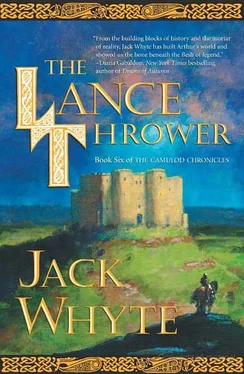Even so, they had not enjoyed sole possession of their new lands for long, for the route their forefathers had followed down and across Gaul attracted other wanderers, most notably the German tribes the Romans called the Alamanni, who were also looking for a place to settle. When the first of these new arrivals saw the beauty of our rich lands around the Lake of Genava, they decided they had wandered far enough, and so they spread out among and around our settlements and began to set down roots of their own.
For some time after that, we coexisted peacefully with them. But the Alamanni kept on coming south, in ever-increasing numbers, and soon there was no more room for newcomers. Tensions sprang up between the incoming land-hungry migrants and our own people and soon grew into hostilities that quickly escalated into full-scale war. That war had lasted longer than my lifetime and had ended only two years before, when our forces, better trained and more disciplined than the masses of Alamanni migrants, finally won a decisive and bloody victory over an army more than twice their numbers.
After that battle the enemy, shattered by their enormous battle losses, had sought terms to end the conflict, and it had been agreed by the leaders of both sides that the Alamanni would withdraw their southern border northward by fifty miles, leaving us to live unrestricted in our own small region on the southern shores of Genava. It was a great triumph for Ban of Benwick. But still, I thought, the war had been over now for two years and our whole country was at peace and growing prosperous again, yet Ban had done nothing about seeking vengeance against this Clodas. Even as the thought formed in my mind, however, the King anticipated it.
“Even although we are now at peace, I can make no move against Clodas yet. He is too far removed.”
“Where is he?”
“Far to the north and west, in the Salian regions on the borders of Germania. Five hundred miles from here, at least.”
“Five hundred miles?”
“Aye. What did you think? I told you it took Chulderic more than half a year to reach us after the murders. He could have been here sooner, had he been mounted and had an escort, but he was alone and on foot, traveling through hostile territory all the time, and he had a woman and a baby with him.”
“Five hundred miles …”
“A long way, Clothar. Not a journey to be undertaken lightly, even with an army at your back. It would take years of preparation for us to wage a campaign that far away from home, even if it did not mean having to fight our way every single step from here to there. And even were I ready now, I couldn’t take my army away for that length of time. The Alamanni would break the treaty as soon as we set out, and there would be nothing left for us to come home to when our campaign was over.”
This was information I did not want to hear, and yet it puzzled me. “Why would you have to fight every step of the way, Father?”
“Because we would be traveling through other people’s territories. No one wants a foreign army marching through their lands, even if it doesn’t threaten them with war. Armies have to eat, and they eat off the land, and that land already belongs to people who need the food themselves, so they will fight fiercely to protect it. We would have to fight our way northward and westward for five hundred miles. That would be madness. And we are not a seagoing people, so we could not make the journey by water.”
“Then we can never take revenge for my father and mother.”
“No, that is not what I said.” He paused, gazing directly into my eyes until he was sure I was listening intently. “What I said was that when you are ready—strong enough and grown into your own manhood—Benwick will give you soldiers enough to claim your kingship.”
“Germanus,” my mother said, and both of us looked at her, me thinking that she had meant Germania, the land King Ban had mentioned moments earlier. But then she said it again. “Tell him about Germanus.”
The King frowned. “I intend to, Vivienne, as soon as I may.”
I looked from one to the other of them. “Who is Germanus?”
“A friend.” The King looked at me again, his eyes narrowed. “You’ll remember what I said about your father and I being brothers in arms. I said there were three of us, one of them a man who outranked both of us by far. That was Germanus, Legate Commander of the Imperial Armies of Gaul, appointed by the Emperor Honorius himself.”
“An Imperial Legate Commander? He was my father’s friend?”
“Friend and brother, as he was to me. The three of us were as peas in a pod for years. But whereas your father and I were warriors and minor kings, Germanus had great power at his command, with almost a hundred thousand troops at his disposal before he left the legions. He left the same year your father and I left, but where we returned to our former lives, Germanus joined the Church. He is a bishop now, still wielding great power, though of a different kind, and people are saying he has become a worker of miracles, a very holy man.”
He thought about that for a moment, and then smiled. “Your father would find that amusing. I do, too, God knows, because the Germanus we knew as young men loved to laugh at other people’s folly and he was no one’s idea of a very holy man. He was a fine man, completely admirable, among the best of the best by anyone’s standards: strong, courageous, afraid of nothing and absolutely trustworthy.” He smiled again, a savage kind of grin. “And now that I think of it, he worked miracles even then, years ago … but those were miracles of soldiering—achieving the impossible, it sometimes seemed, with very few resources.” His smile faded but remained in place, as though at something only he could see. “He was always a noble man, Germanus, when we three rode together … honest and straightforward as the day is long … . But we would never have thought of him as holy .”
“What does holy mean?” I asked.
“mean? I’m not sure what it really means. Devout, pious, unworldly, and possessing sanctity, I suppose. A man of God. It means all of those things yet more than all of them, for a devout and pious man—an ordinary bishop, for example—cannot expect to cast out devils easily or bring dead people back to life. A man needs true holiness to do such things. Yet I have heard tales of my friend Germanus doing them, and often. And they are tales from people I know and trust.”
“Where is he now?”
“He’s here, in Gaul. He is the Bishop of Auxerre, about two hundred miles northwest of where we sit now.”
“Oh-zerr?” I had never heard of such a place. “What kind of name is that?”
“It’s what the local people there call their town. What more explanation do you need? Its old Roman name was Autessiodurum, back in the days of the Caesars when that part of Gaul was officially called Gallia Comata. But I suppose Autessiodurum was too much of a jawbreaker for the local folk, much the same as Gallia Comata turned out to be. It’s been hundreds of years since anyone has called that region Gallia Comata.”
“Comata? That means long-haired. How could that be the name of a country?”
The King grinned at me, his fine white teeth flashing. “Because all the people who lived up there were long-haired back then, when Julius Caesar first came strutting, thinking to conquer us. That was the explanation I was given, anyway, when I asked my tutor the same question at about your age.”
“What were we called, then?”
“We?” He laughed. “Your people were Salian Franks. They lived up there, below the Rhine River. This part of Gaul down here was called Gallia Cisalpina, Cisalpine Gaul, because the Alps lie between us and the northern borders of Italia. My people called themselves Ripuarian Franks—but do not ask me what that means because I have no idea. The Romans, however, called us all Gauls.”
Читать дальше









